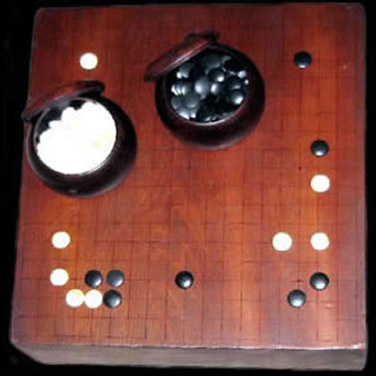Go

Go is played by two people on a board with a grid of 19x19 lines. The players take it in turns to place black and white stones on the intersections of the lines. The aim is to surround the largest possible areas, i.e. vacant intersections on the board, with your own stones, whereby the opponent’s stones can also be encircled. The game continues until neither player wishes to place any more stones. The intersections in the areas obtained and the stones "captured" from the opponent are totted up as points. The player with the most points is the winner.
History
The "game of the gods" originated in China. Legend has it that the game was invented in third millennium BC, and the first confirmed reference to it dates back to 500 BC, which makes Go one of the oldest board games in the world still played today. In the early seventh century AD, "wei-qi", as the game was called in China, reached Japan, where it was preserved for centuries as high art until it eventually fell into decline in the nineteenth century. Thanks to its portrayal in the Japanese daily press, however, Go has seen a revival since the beginning of the twentieth century. The game is still rated highly in China, Japan and Korea to this day, and has even gained many fans in Europe and the USA in recent years.
Mathematics
The striking thing about Go is the simplicity of the rules compared to the complexity of the game, which stems from the 361 intersections (nineteen by nineteen). For a long time, computer programmes were inferior to humans. The large number of different positions and playing possibilities in a particular position, not to mention the difficulty of assessing a given position, had thwarted successful programming.
The computer programme AlphaGo, developed by the company DeepMind, managed the surprising and definite break-through. With the use of artificial neuronal networks, AlphaGo defeated the European champion Fan Hui in 5 out of 5 games in October 2015. The programme was further improved and won against the professional player Lee Sedol – 18 times winner of a world championship – in 4 out of 5 games.